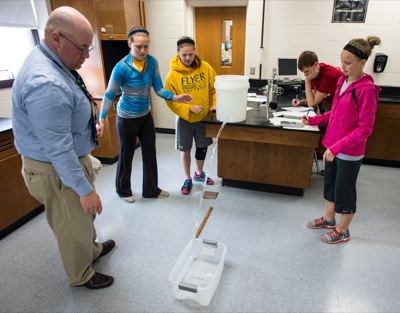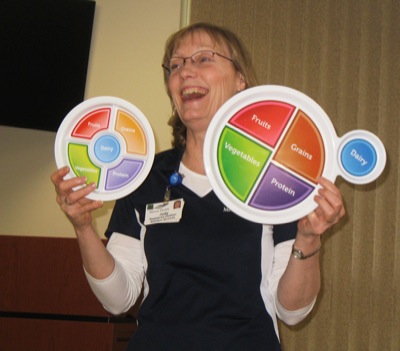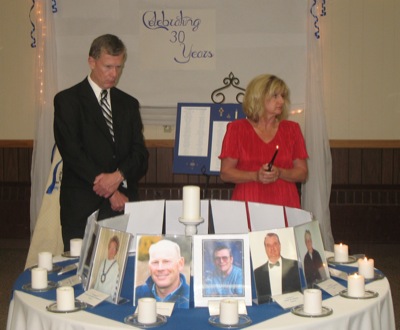Tuesday, May 6th, 2014
Educators fear state changes will drain funds
By Doug Drexler

Photo by Mark Pummell/The Daily Standard
Marion Local students Kristi Moorman, Allison Rosenbeck, Randy Knapschaeffer and Beth Wolters perform a water flow rate test in Todd Ashbaugh's dual enrollment physics class Wednesday morning.
Proposed changes to state programs that allow high school students to earn college credit could lessen costs to parents, financially burden schools and water-down higher education classes, some local superintendents fear.
The Ohio Board of Regents, which oversees higher education, has proposed merging the current Post Secondary Enrollment Opportunity and dual enrollment programs into a new measure called College Credit Plus. It's based on Gov. John Kasich's plan to increase the number of Ohioans with college degrees while reducing higher education costs, according to Coldwater schools superintendent Rich Seas. Under the proposal, CC+ students could not be charged for the per-credit cost and school districts would pick up the tab, he said.
"When a student attends WSU-LC (Wright State University-Lake Campus) for PSEO, the money is taken from Coldwater and transferred to WSU-LC. In dual enrollment, the parents pay the money. In CC+, all the money will come from Coldwater, whether it's PSEO or dual enrollment," Seas said. Putting more high school students into college classes will endanger the quality of those courses, he said.
"Will the student receive a true college-level class or a dumbed-down version of a college course?" Seas asked. "Higher education needs to make sure they maintain high standards so that businesses receive students who are knowledgeable, can think critically and problem-solve and work collaboratively.
"I'm concerned about the direction we're going," he continued. "Our way of educating kids is being jeopardized."
The complete high school experience includes participating in extracurricular and social activities, Seas said. College classes would cut into that time, he added.
"How do you do high school and college at the same time?" he asked.
The current PSEO is a legislated program paid with funds funneled through the student's school district from the state, according to Gretchen Rentz, assistant director of student services at WSU-LC. High school students can take classes at the campus or online.
Dual enrollment is offered through agreements between WSU and area school districts, she said. Students can take an approved class for college credit and pay for it themselves. The courses are either taught by a high school teacher approved by the college or by WSU faculty at the high school. The courses follow the same learning outcomes and objectives as on-campus classes, Rentz said. Tuition for the 2013-14 academic year for dual enrollment was $135 per credit hour.
New Bremen Local Schools wants to stop offering dual enrollment, superintendent Howard Overman said.
Overman said the district could not sustain the expense of CC+, and he did not think tax dollars dedicated to local education should be used to pay for students' college credits. CC+ class grades would be considered equivalent to Advanced Placement-weighted grades under the program, he added.
"We don't want the CC+ to dictate our grading system," Overman said.
The current proposal mandates all districts to offer CC+. Overman hopes that will change by the time it becomes law.
"We'll cross that bridge when we have to," he said. "Financially, it would really strap us. If you don't have the funds, how do you do that?"
Rentz said officials at the college level also are apprehensive about the proposal.
"We share in the concerns of our area school districts in regard to the College Credit Plus legislation," Rentz said. "So much so, that we held College Credit Plus information sessions in late March to start a dialogue about (it) and what it could mean for both the school districts and the university. From Wright State's perspective, we are being asked to convert many of our degree programs to three-year degrees."
Part of the CC+ plan includes programs allowing high school students to enter college with credits in hand to earn degrees in less time, she said.
The measure has been approved by the Ohio House but is awaiting action in the Senate, State Rep. Jim Buchy, R-Greenville, said. The funding system is not finalized, though the proposal, so far, would allow districts to negotiate costs with the colleges.
"I'm very sensitive to making sure what we do helps the districts," he said.
The bill is awaiting testimony in the Senate's education committee, Sen. President Keith Faber, R-Celina, said. He does not think the proposal would be too expensive for districts; however, he would not comment on funding plans that are still being worked out. He noted that since the state already supports school districts and colleges, districts should not need to come up with large amounts of money.
Parents already are paying state and local taxes to support districts and colleges, Faber said, adding that he doesn't think they should have to pay tuition on top of those costs, at least to public colleges, which receive taxpayer support.
The Senate is trying to figure out how colleges and school districts would split the cost. Districts already pay teachers and other costs involved in dual enrollment classes in high schools and shouldn't have to pay the full college tuition cost, Faber said.
"We're trying to find out where the balance is," he said, adding that the proposal would be a great help to the right students.
"It should be an option for prepared students," Faber said. "I think it's one more tool we put in the education basket."
However, some educators worry about an over-emphasis on college education.
"This push for more dual enrollment or the new term 'College Credit Plus' also comes with the message that we need more students to go to college, which is not necessarily the whole story," St. Henry schools superintendent Rod Moorman said. "Students and parents need to know the opportunities that exist with area businesses and manufacturers that may require some training before employment, and the employer may provide this training, but this employment does not need a four-year college education.
"College Credit Plus is another push for more students to get a college education - on the backs of the school district taxpayers," he said. "If students want this opportunity, then we can help make this happen, but at their own cost. I'm not saying that students shouldn't have this pathway available to them - just not on the backs of the school district - it's another unfunded mandate passed onto the taxpayers."
Marion Local Superintendent Mike Pohlman concurred.
"It is more important to us as educators that our students receive a well-rounded education that teaches them to be critical thinkers and problem solvers and not just look good on paper. I agree with Rich (Seas) in that there is a big rush to graduate our students with a college degree. But are they really mature enough to enter into some of these careers? It is just passing the expense of a student's college education onto the taxpayers of our local community. It is just one more thing that will impact us financially that will be hard for me to budget. I love giving our students opportunities, but unfunded mandates are eating us alive."
The caliber of education is another concern, according to Parkway schools superintendent Greg Puthoff.
"What is the educational quality of the program that our students will receive? It looks good on paper, but what will the final program look like, and is this the best for our students?" he asked.
Celina Superintendent Jesse Steiner said he appreciates the opportunity high school students gain by being able to get college credits, but he is waiting until the proposal takes its final form before deciding its merit.
St. Marys superintendent Shawn Brown, Minster superintendent Brenda Boeke and Fort Recovery superintendent Shelly Vaughn opted not to comment for this story.
Learning options:
PSEO Dual
Celina 14 0
Coldwater 8 0
Marion Local 17 13
Minster 15 60
New Bremen 4 18
Parkway 4 0
St. Henry 8 13
St. Marys 21 1
The number of students in the Post Secondary Enrollment Opportunity and dual enrollment programs at local school districts.






